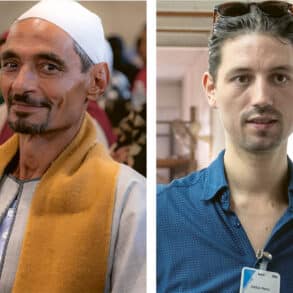Governance is a framework of agreements designed to free up individual and organizational capacities in service to the interactions of social life. Effective governance depends on real human-engendered agreements. John Bloom explores the origin and recognition of the highest level of agreements and what capacities we need in order to perceive and realize them in a time of individualism and social uncertainty.
Agreements are immensely practical. When they operate well, they make inner life peaceful and outer life navigable, even liberating. Whether they are created through habit, founded in a moment of shared cognition, or crafted as democratically derived policy, we need them for the sake of co-existence. There are levels of agreements: from customs, to behavioral codes, to laws and constitutions, to the most profoundly moral level of duty, defined by J.F.W. Goethe as “to love what one commands oneself to do,” which is an internal agreement with and commitment to oneself. Sometimes, agreements are created by others and precede us when we step into a social field. Sometimes, we are called upon to create them to bring coherence to social chaos.
Regardless of their origin, our consciousness of and practices with agreements matter to both our individual wellbeing and a healthy social life. In our emerging awareness of them, agreements reflect something of our sympathies and antipathies and stimulate our inner discernment. In other words, agreements and how we live with them are powerful contributors to self-knowledge and point to how we experience that knowledge in and through others.
Our social interactions are suffused with agreements. They are necessary in the social realm, and yet they need to be recognized as manifestations of moral and ethical fields that derive from the spiritual realm of which we all are part. They are a part of karma connected to what we have said yes or no to through our will and our deeds and the consequences of those inner decisions. What we call agreements reflects an alignment of mutual recognition and a shared willingness to answer the question: why are we here together at this time?
Origins of Agreements
Consider the following: agreements pre-exist our relationships, even though they only become evident as two or more people consent to them. (This is like value or its measure in price that only comes present at the time of the transaction). This is not an argument for pre-determination or against spiritual freedom, but rather to say that we exercise our freedom as we make our internal agreements and how we live up to those agreements. Our agreements with others mirror this exercise of freedom.
Therefore, there are inner agreements we make with ourselves—each individual is already living within a complex of agreements, some inherited, some self-generated—even before we come into relationship with another person. Additionally, when two individuals meet, outer agreements are necessary to make it possible to proceed into the exploration of the relationship, be it transactional or more intimate and destiny-related.
Bringing consciousness to such pre-existing agreements is a kind of awakening. To work with and transcend this awakening, we have paths of self-knowledge, such as those described in Rudolf Steiner’s How to Know Higher Worlds. Understanding the nature and presence of agreements, inner and outer—and how they are operating in any given moment or circumstance—offers each party within the agreement the potential to be fully present and to begin to perceive the other, to connect deeply in trust, and to serve as a kind of accountability partner for them.
This is deep social transformation that invites the interest of the spiritual world in human endeavors. Finding a new relationship to the processes of agreement formation that relegates personal patterns and assumptions will support experiencing spiritual freedom in a culture of community, including in organizations that have a specific mission in the world.
If we accept the notion of reincarnation and, further, that we reincarnate in cycles across lifetimes, then pre-existing agreements may also “travel” with us across lifetimes and offer opportunities for continued learning, course correction, and reconciliation—in short, the harmonizing of karma both old and new. Further, if we embrace the living reality of hierarchies in the spiritual world, then each of us has an angel, and beyond that, there is an archangelic realm that is engaged in our interconnectedness, and an archai realm linking us to cosmic wisdom. This is a critical understanding because each of us develops not only from self-knowledge but also from that which comes to us from others. Reciprocity with the spiritual world multiplied across all our relationships is an earthly and non-hierarchical social picture of the activity of spiritual beings.
Intersection of the Spiritual and the Social
There is an additional picture from the New Testament. “For where two or three have gathered together in My name, there I am in their midst.” (Matthew 18:20) This denotes a profound intersection of the spiritual and the social. If we accept this offering of the Christ-being, then both our deepest connection to spirit and the harmonizing of karma reside in our social capacities. At the heart of those social capacities are agreements, spoken and unspoken, that we hold with ourselves and each other, whether of a personal or more organizational nature. Further, the moral foundations for those agreements are ever more essential when there is a conscious acknowledgment of a spiritual dimension such as in an anthroposophical endeavor.
Finding our way to the spiritual through the social is no easy task. It requires a level of self-knowledge and self-management that resides in the activity of a developing consciousness soul. Such activity is deeply hindered by distrust and judgment. Rather, it is through interest, patience, and inquiry that one can live into another’s thoughts and being. It falls to each of us to discern and work with inner freedom and to know that setting the primacy of one’s inner freedom aside to come into agreement with another is not an abrogation of freedom but rather a process of surrender that will support generative freedom. We simply have to know the world and others to know ourselves. Each of us is a necessary complement of the whole. Agreements serve as navigation. Just as the spiritual world is never still, neither are agreements, despite the fact that they might appear that way. In the ideal, each time we come together, we are free to recreate or renegotiate our agreements.
Governance and Agreements
There is a direct correlation between how we govern ourselves as individuals and how we work together to govern our social forms. Since governance is nothing more than a framework of agreements, which, if well designed, supports freedom to bring our capacities in service to mission, then agreements themselves are at the core of governance work. Agreements embody trust between individuals and make that trust palpable and sustainable. The beauty of this perspective is that relationships are sustained by active engagement in living agreements, rather than by the power dynamic of fixed right and wrong judgment outside a shared understanding. Working with the soul gesture of “calling in” (to agreement) rather than “calling out” (as in error) is one approach to this process. The former leaves an individual free to step back into agreement; the latter puts a box around someone and actually counters the agreement process.
Some people fear that when an agreement is recorded or written down, it impinges on or compromises the freedom of the individual. If done well, the opposite becomes possible. To the extent that an agreement makes conscious, visible, and true the understanding of one another, freedom takes on a social and soul dimension that is additive in nature. Then, we becomes an expanded I. Such agreements deepen the opportunity for self-knowledge through understanding others in living reciprocity.
We generally recognize the need for governance in the material world but resist “governance” when it seems to rub up against our freedom. This is a natural and rightful tension as each of us also carries within ourselves the ever-present intersection of the spirit and social impulses, the meeting of our I with the reality of others and the world we inhabit, together.
The times demand that we find a new relationship to spirit-cognizant agreements as a path towards freedom. When spirit and soul intersect in social spaces, the commitment to stay in that space long enough to work through to a new sense of inner freedom out of social collaboration is the work needed. The risk of not doing this work results in governance without clarity and higher purpose, which in turn leads to a kind of unconscious and unrecognized imprisonment in the name of freedom. The path of agreements is a path toward harmonizing karma, one that is available to everyone willing to work on it. We can co-create agreements and then be co-responsible for them. Through such a process, we might harmonize karma through inner and outer freedom—spiritual freedom that we make possible for and with each other.
Photo Martin Woortman









